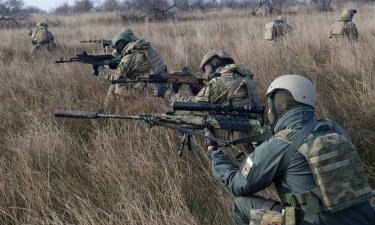Molotov-Ribbentrop Pact Killed Two Birds of Prey With One Little Stone
On August 23, the world marks another anniversary of the Molotov-Ribbentrop Pact (signed in 1939) against the background of historical speculations. Traditionally, the USSR is named one of the primary instigators of the start of WWII.

It was actually the West that pushed Germany towards the war against the USSR. The West got into the Munich moment with Nazi Germany and let Hitler destroy Czechoslovakia. It is worthy of note that Poland, which was "divided" between Hitler and Stalin, was not an innocent sinless nation. This country took an active part in the liquidation of Czechoslovakia and received a large piece of land near its southern border as a result of the agreement with Nazis.
There are no doubts about the fact that the pact was highly profitable for those who signed it. One should not pay attention to the moral side of the issue because everyone knows that politics is dirty business. At any rate, the territories, which the Soviet Union received as a result of the pact, gave the nation an opportunity to restrain the German offensive for two months.
Russia Today: Stalin an evil genius
One should pay attention to another interesting aspect. Let's try to recollect the time, when the Molotov-Ribbentrop Pact was signed. That was the time, when the USSR was fighting against Japan, Hitler's ally, near the eastern borders.
In accordance with the document signed on November 25, 1936, Germany and Japan agreed not to conclude mutual agreements with the common enemy, including the USSR, without the previous agreement with each other.
The Molotov-Ribbentrop Pact was a blatant violation of those agreements. Japan's ally played a dirty trick on the Asian nation. The Pact implied Hitler's refusal from the previous agreement with Japan.
As a result, Japan ceased its military actions near the eastern borders of the USSR. When the Molotov-Ribbentrop Pact was signed on August 23, Soviet troops encircled the basic group of the Japanese forces. Of course, Japan perceived the signing of the Soviet-German pact as an act of treason because Germany and the USSR were obliged not to take hostile actions against each other.
Japan 's then foreign minister Arita Hatiro sent a note of protest to Germany's ambassador to Tokyo on August 25, 1939. The signing of the Soviet-German pact triggered a governmental crisis in Japan and considerably changed military plans for the future.
The Japanese government with PM Hiranuma Kiichiro at the head stepped down on August 28, 1939. Afterwards, Kiichiro chaired the group advocating the joint Japanese-German war against the USSR. It was the first and the last incident, when the Japanese government stepped down because of the agreement signed by two other countries.
The German administration had realized the profits of waging the war against the USSR on two fronts. Hitler was aware of the fact that it was impossible to defeat the enemy without the help from his Pacific ally, Japan. He attempted to retrieve the relations with Japan having signed the Berlin Pact on September 27, 1940 between Germany, Italy and Japan.
However, the Molotov-Ribbentrop Pact was more than just an act of treason for such a country as Japan. The previously warm relations between Germany and Japan were destroyed. The Molotov-Ribbentrop Pact showed what kind of a reliable ally Hitler was.
When he organized the campaign against the USSR in 1941, Japan decided not to miss a chance to take revenge on Germany. On April 13, 1941, two months before Nazi Germany's attack against the USSR, Tokyo signed a non-aggression pact with the USSR, which marked Japan's negligence of the previously signed Berlin Pact. The Japanese signed the non-aggression pact despite Germany's concerns.
As a result, Japan did not start any military action against the USSR even during the hardest years of the Great Patriotic War in 1941-1942. Instead of the USSR, Japan attacked the USA and its Pacific allies. Hitler made a suicidal decision and declared war on the United States in a hope that his eastern allies would help him defeat the Bolsheviks.
Japan did not help Hitler in the end.
The signing of the Molotov-Ribbentrop Pact virtually destroyed the Eastern political bloc. Afterwards, the former members of the bloc were acting independently from one another, which eventually led for their defeat afterwards.
Let's just imagine what would have happened if the USSR had not signed the agreement in 1939 with Germany and if Japan had attacked the Soviet Union rather than the USA. First and foremost, the USSR would not have been able to redeploy the renowned Siberian divisions by the beginning of the battle for Moscow. Those divisions played a huge role in the destruction of the German army near Moscow.
Japanese generals believed during those years that the beginning of the war between Germany and the USSR was a great chance for Japan to solve its northern problem. The war could have had a different ending indeed. Japan was much stronger than the Soviet Union. The USSR's Pacific fleet was tiny in comparison with that of Japan.
Japan had 12 aircraft carriers of different types, 13 battleships and 48 various cruisers - the USSR had no similar vessels at all. Japan had 151 destroyers against the USSR's 14. If only Japan had attacked the Soviet Pacific Fleet, it would have become the Soviet Pearl Harbor.
History showed that the German-Soviet pact was signed right on time. The pact did not let the union between Germany and Japan materialize, nor could it be possible to conduct the two-front war against the USSR.
Sergey Balmasov
Pravda.Ru
Subscribe to Pravda.Ru Telegram channel, Facebook, RSS!


